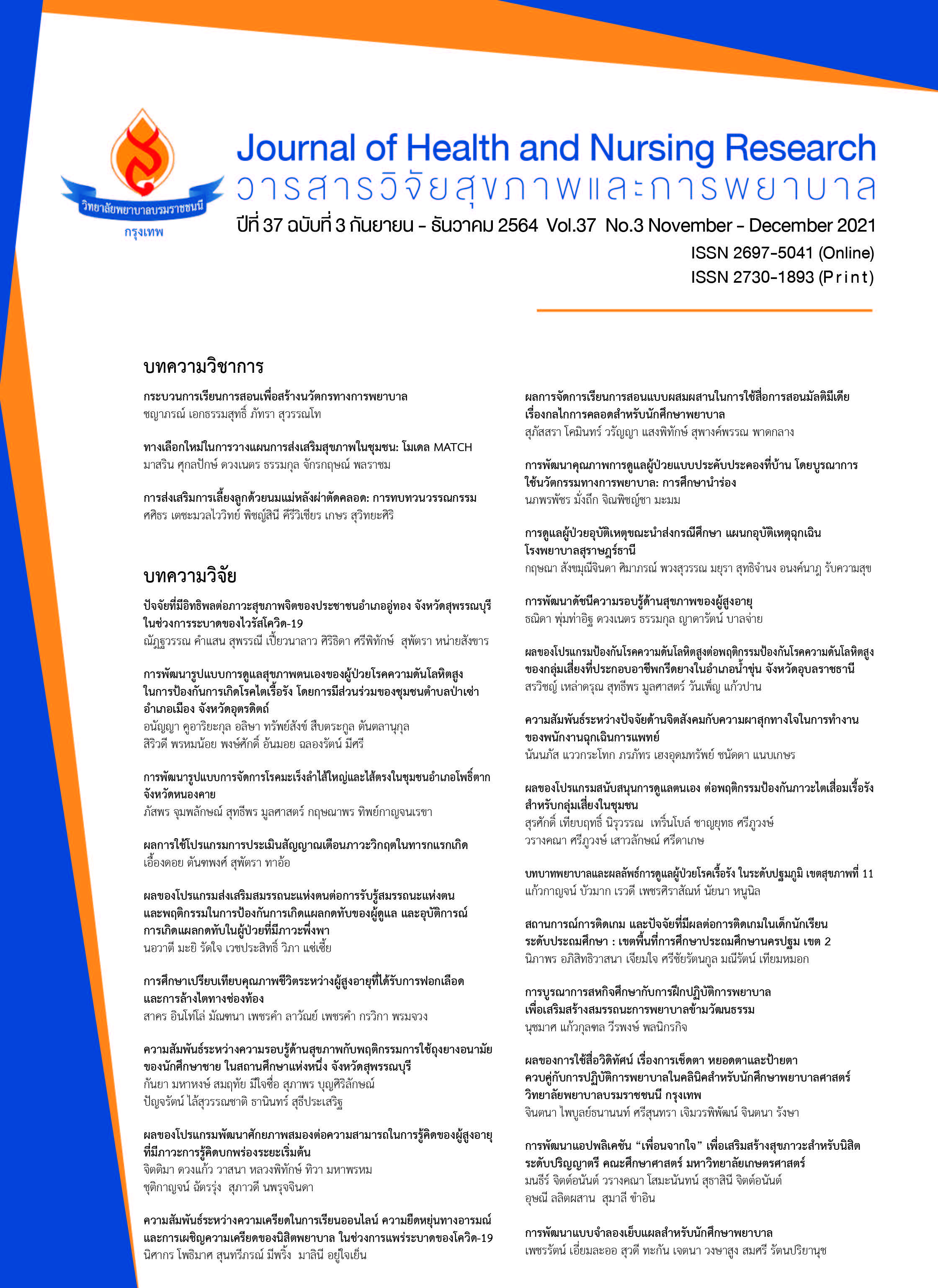การพัฒนาแอปพลิเคชัน “เพื่อนจากใจ” เพื่อเสริมสร้างสุขภาวะ สำหรับนิสิตระดับปริญญาตรี คณะศึกษาศาสตร์ มหาวิทยาลัยเกษตรศาสตร์
คำสำคัญ:
แอปพลิเคชัน, สุขภาวะ, สุขภาพจิต, สุขภาพกาย, นิสิตระดับปริญญาตรีบทคัดย่อ
บทนํา: สุขภาวะเป็นคุณลักษณะที่สำคัญยิ่งของบุคคลโดยเฉพาะนิสิตนักศึกษาระดับปริญญาตรีซึ่งจะเป็นกำลังสำคัญของประเทศในอนาคต อย่างไรก็ตาม สุขภาวะของนิสิตนักศึกษาระดับปริญญาตรีจำเป็นต้องได้รับการเสริมสร้างอย่างเร่งด่วน เนื่องจากการเกิดปัญหาความเครียดและโรคภาวะซึมเศร้า
วัตถุประสงค์การวิจัย: การวิจัยครั้งนี้จึงเกิดขึ้นโดยมีวัตถุประสงค์เพื่อสร้างและพัฒนาแอปพลิเคชัน “เพื่อนจากใจ” เพื่อเสริมสร้างสุขภาวะสำหรับนิสิตระดับปริญญาตรี คณะศึกษาศาสตร์ มหาวิทยาลัยเกษตรศาสตร์
ระเบียบวิธีวิจัย: การดำเนินการวิจัยแบ่งออกเป็น 2 ระยะ ประกอบด้วย ระยะที่ 1 การสร้างและพัฒนาแอปพลิเคชัน “เพื่อนจากใจ” และระยะที่ 2 การศึกษาผลของแอปพลิเคชัน “เพื่อนจากใจ” ที่มีต่อสุขภาวะของนิสิตระดับปริญญาตรี คณะศึกษาศาสตร์ มหาวิทยาลัยเกษตรศาสตร์ กลุ่มตัวอย่าง คือ นิสิตระดับปริญญาตรี ชั้นปีที่ 1-5 คณะศึกษาศาสตร์ มหาวิทยาลัยเกษตรศาสตร์ ปีการศึกษา 2562 จำนวน 29 คน ซึ่งได้มาด้วยวิธีการสมัครใจ การวิเคราะห์ข้อมูลเชิงปริมาณใช้สถิติทดสอบทีแบบไม่เป็นอิสระจากกัน และสถิติเชิงบรรยาย ได้แก่ ค่าเฉลี่ย ส่วนเบี่ยงเบนมาตรฐาน และการวิเคราะห์ข้อมูลเชิงคุณภาพใช้การวิเคราะห์เนื้อหา
ผลการวิจัย: พบว่า (1) แอปพลิเคชัน“เพื่อนจากใจ” ประกอบด้วย 4 ส่วนหลัก ได้แก่ “chatbot” “ข้อมูลสุขภาพใจ” “ข้อมูลสุขภาพกาย” และ“การบริการปรึกษาเชิงจิตวิทยา” (2) แอปพลิเคชันสามารถเสริมสร้างให้นิสิตมีสุขภาวะที่ดี (3) กลุ่มตัวอย่างมีความพึงพอใจต่อแอปพลิเคชันในระดับมาก (M=4.21) เนื่องจากแอปพลิเคชันมีความสะดวกต่อการใช้งาน
สรุปผล: การพัฒนาแอปพลิเคชัน “เพื่อนจากใจ” ครบทุกส่วนสามารถเสริมสร้างสุขภาวะของนิสิตได้ดีและสร้างความพึงพอใจในการใช้อยู่ในระดับมาก
ข้อเสนอแนะ: (1) ผู้ใช้ควรใช้แอปพลิเคชันให้ครบทุกฟังก์ชันเพื่อให้เกิดประสิทธิภาพและประสิทธิผลสูงสุด (2) ผู้ใช้สามารถเลือกใช้ฟังก์ชันในแอปพลิเคชันตามสถานการณ์ที่ต้องการคำตอบในขณะนั้น หรือเลือกใช้วิธีการในแอปพลิเคชันเหมาะสมกับการรับรู้ของตน
Downloads
เอกสารอ้างอิง
Royal Thai Government Gazette. National Health Act, B.E. 2007[Internet]. 2010 [cited 2019 Sep 4]. Available from: http://web.krisdika.go.th/data/law/law2/%ca71/%ca71-20-9999 -update.pdf. (in Thai).
Diener E, Heintzelman SJ, Kushlev K, Tay L, Wirtz D, Lutes LD, Oishi S. Findings all psychologists should know from the new science on subjective well-being. Canadian Psychology/psychologie canadienne 2017;58(2):87.
Houben M, Van Den Noortgate W, Kuppens P. The relation between short-term emotion dynamics and psychological well-being: A meta-analysis. Psychological bulletin 2015;141(4):901.
Melchior S, Mabry C. The impact of mental health on physical well-being: An intersectional analysis; 2016.
Rüppel F, Liersch S, Walter U. The influence of psychological well-being on academic success. Journal of public health 2015;23(1):15-24.
Coleman J, Hendry LB, Kloep M. Understanding adolescent health. Adolescence and Health 2007;4:1.
Mastekaasa A. Marriage and psychological well-being: Some evidence on selection into marriage. Journal of Marriage and the Family 1992:901-11.
Sonnentag S. Performance, well-being, and self-regulation. Psychological management of individual performance 2002:405-23.
Patel PC, Wolfe MT. Money might not make you happy, but can happiness make you money? The value of leveraging subjective well-being to enhance financial well-being in self-employment. Journal of Business Venturing Insights 2019;12:e00134.
Department of Mental Health, Ministry of Public Health. Department of Mental Health cares for Thai youth with depression “People should listen to understand”[Internet]. 2019 [cited 2019 Sep 4]. Available from: http://www.prdmh.com. (in Thai).
Chulalongkorn University. 2019. Know deeply with Chulalongkorn University “Understanding Depression in Adolescents”[Internet]. 2019 [cited 2019 Sep 4]. Available from: https://www.chula.ac.th/cuinside/17693/. (in Thai).
Office of the National Economic and Social Development Council. Thai social situation report, quarter 1, 2019[Internet]. 2019 [cited 2019 Sep 4]. Available from: https:// www.nesdb.go.th/ewt_news.php?nid=8949. (in Thai).
Hilty DM, Maheu MM, Drude KP, Hertlein KM, Wall K, Long RP, Luoma TL. Telebehavioral health, telemental health, e-Therapy and e-Health competencies: The need for an interprofessional framework. Journal of Technology in Behavioral Science 2017;2(3-4):171-89.
Rueangchan N, Chanthanon C, Saengprasan C. The study of smartphone usage behavior for education from student of faculty of management science, Rajabhat Sakon Nakhon University. Journal of Suvarnabhumi Institute of Technology (Humanities and Social Sciences) 2018;4(2):294-303. (in Thai).
Bakker, D., Kazantzis, N., Rickwood, D., & Rickard, N. 2018. Development and pilot evaluation of smartphone-delivered cognitive behavior therapy strategies for mood- and anxiety-related problems: MoodMission. Cognitive and Behavioral Practice. 25(4), 496-514.
Dorian,E. and Erhardt, D. 2015. MoodKit / Moodnotes App Developers Offer New Year's Resolution Tips for Well-Being. http://www.thriveport.com/blog/files/ ff2e9475ef8798 4912d089acdbea40f5-8.html, December 5, 2019.
Lovejoy, C. A., Buch, V., & Maruthappu, M. 2019. Technology and mental health: The role of artificial intelligence. European Psychiatry. 55(13), 1-3.
Han M, Lee E. Effectiveness of mobile health application use to improve health behavior changes: a systematic review of randomized controlled trials. Healthcare informatics research 2018;24(3):207-26.
Lee CY, Tsao CH, Chang WC. The relationship between attitude toward using and customer satisfaction with mobile application services: An empirical study from the life insurance industry. Journal of Enterprise Information Management 2015;28(5):680-97.
Ohk K, Park SB, Hong JW. The influence of perceived usefulness, perceived ease of use, interactivity, and ease of navigation on satisfaction in mobile application. Advanced Science and Technology Letters 2015;84:88-92.
Baker-Eveleth L, Stone RW. User's perceptions of perceived usefulness, satisfaction, and intentions of mobile application. International Journal of Mobile Communications 2020;18(1):1-18.
ดาวน์โหลด
เผยแพร่แล้ว
รูปแบบการอ้างอิง
ฉบับ
ประเภทบทความ
สัญญาอนุญาต
บทความที่ได้รับการตีพิมพ์ เป็นลิขสิทธิ์ของวารสารวิจัยสุขภาพและการพยาบาล (วิทยาลัยพยาบาลบรมราชชนนี กรุงเทพ) ไม่สามารถนำไปตีพิมพ์ซ้ำในวารสารฉบับอื่น


















